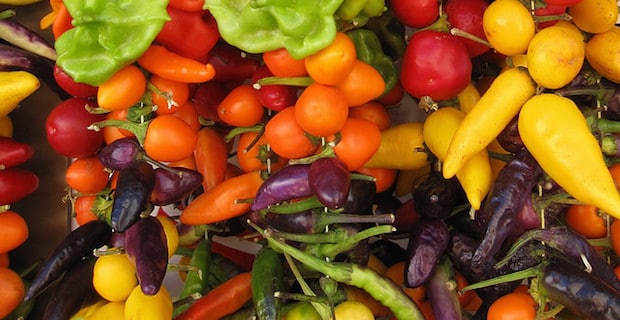
While visiting a farmers market, I came across a booth that carried a variety of edible plants. I had never seen such beautiful and bold colors in all of my life, and the bouquet of smells was intoxicating. I found out that what makes these plants so gorgeous and healthy are phytochemicals.
Plants contain thousands of phytochemicals like lycopene, flavonoids, and others. Studies have found that these compounds may boost the immune system and potentially destroy cancer-forming cells.
Read more about polyphenols and heart health
Sources of Phytochemicals
- Fruits
- Vegetables
- Legumes
- Organic Soy
- Herbs
- Seeds
- Whole Grains
- Green tea
These foods provide the basic nutritional benefits of vitamins and minerals. In addition, these foods have a secondary health benefit obtained through phytochemicals, which have been found to provide a defensive barrier against cellular damage.
- Tomatoes are high in vitamin C and also contain the phytochemical lycopene, which may reduce the incidence of protstate cancer.
- Citrus fruits like oranges, lemons, limes and grapefruits contain flavonoids, which may have an anti-cancer effect.
- Many dark green leafy vegetables like spinach and collard greens contain lutein, found to protect the cells from damage.
- Studies have found that isoflavones, saponins and phytoesterols, found in soybeans and legumes for example, might slow down the growth of tumors.
Ways to Get More Phytochemicals
It is true that availability and access to fresh fruits and vegetables are limited in some parts of the country, resulting in fruits and vegetables to be cost-prohibitive. However, there are a number of ways to increase the intake of these health-promoting foods without too much cost or effort. If the produce is out of season or expensive, then look to the frozen food section; there are a variety of delicious and wholesome choices.
Read more about healthy eating tips for a busy lifestyle
Below are some suggestions for increasing your intake of foods rich in phytochemicals:
- Include vegetables and/or fruits at every meal, either as a side dish or mixed into a main dish.
- Choose fruit-filled cookies such as fig pastry.
- Use fruit as a topping on yogurt, waffles, cold cereal.
- Be creative when preparing a salad. Instead of iceberg lettuce, use a variety of greens such as romaine, bib, arugula, endive and spinach.
- Add lettuce, tomatoes and cucumbers to your sandwiches.
- Replace two meat meals per week with vegetarian meals
- Choose 100% fruit or vegetable juices instead of sugar drinks or soda.
- Experiment with fresh herbs like tarragon, rosemary, garlic, thyme, sage, parsley and cilantro.
- Have green tea instead of coffee, hot chocolate and black tea.
- Add a piece of fruit to your breakfast and lunch (eating the fruit first is better for your digestion).
- Instead of a candy bar, bring along an apple or trail mix with dried fruit.
- Add some color to your tuna or chicken salad with raisins, grapes, apples, pineapple, carrots, zucchini, celery or mango.
Read more about healthy summer salads
In conclusion, the research on the health benefits of phytochemicals continues. Savvy consumers can easily participate in immune-boosting activities by incorporating more fruits and vegetables into the daily diet. You can make a change at any time, so why not start today by adding an apple to your lunch and a couple of celery sticks to snack time?
Image: palestrina55










